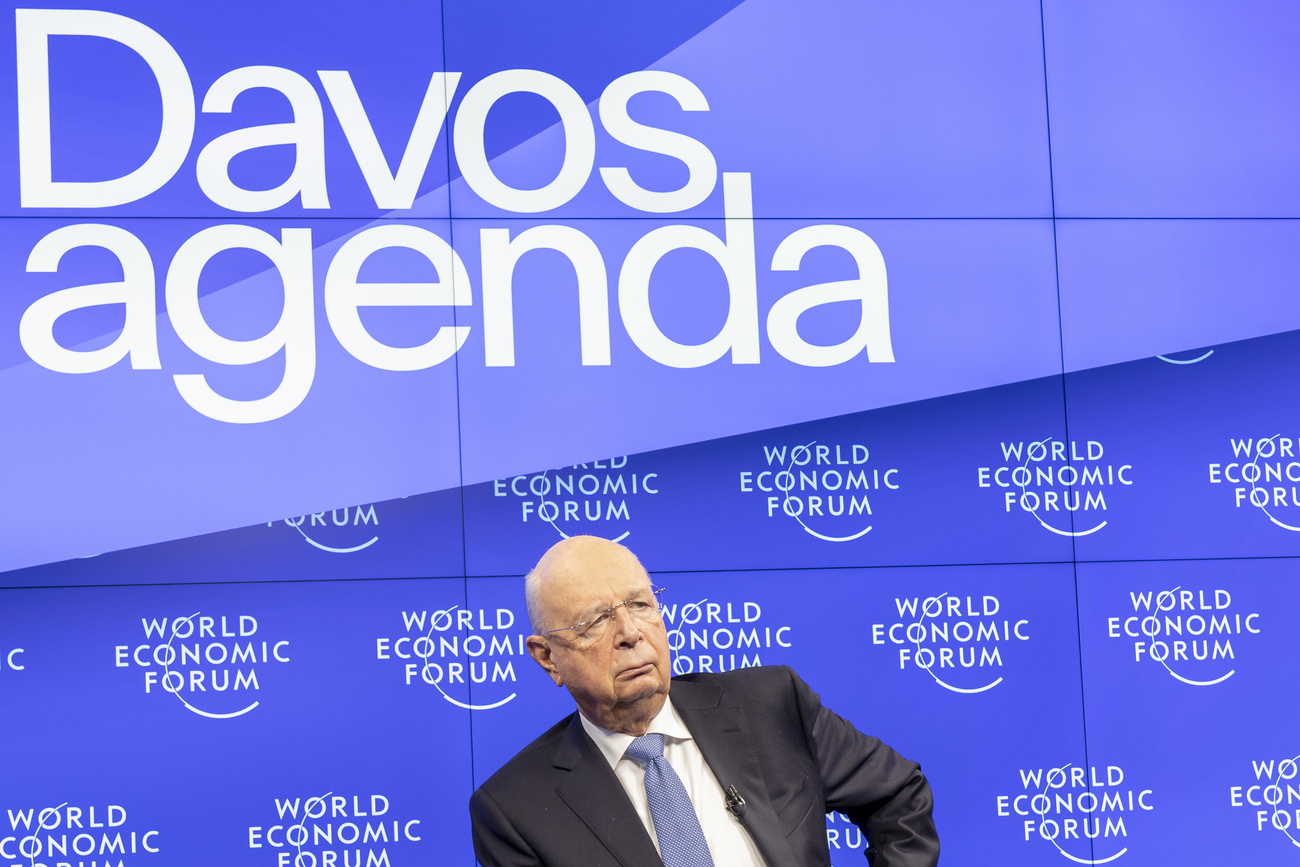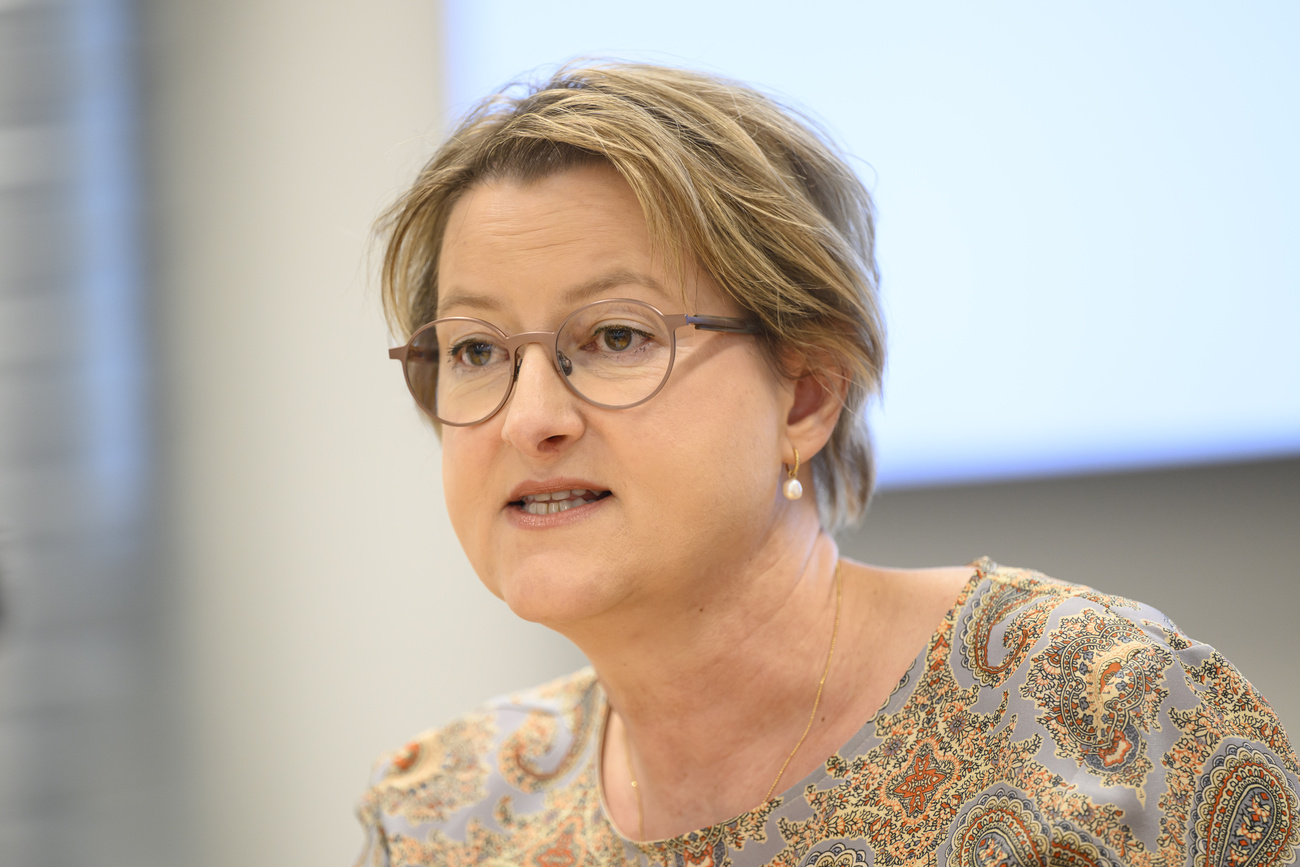
Messy Schwab succession threatens WEF image

The long-term mission of the World Economic Forum (WEF) is to “improve the state of the world”. The Swiss non-profit foundation has a more immediate task: to rescue its credibility in the face of toxic workplace claims and a succession crisis caused by the abrupt resignation of its founder.
+Get the most important news from Switzerland in your inbox
For more than half a century, global business, political and social society leaders have made an annual pilgrimage to the Swiss resort of Davos in January. Created in 1971 as the European Management Forum, WEF has evolved into one of the world’s most significant meeting points for powerful decision makers.
This has enhanced Switzerland’s status as a neutral global networking hub for diplomacy and business. Switzerland has bestowed WEF with the title “other international body”, which gives it the legal status of other influential international bodies based on Swiss soil, such as the United Nations and Red Cross.
+ How ‘Davos Man’ hijacked capitalism
Raft of allegations
But WEF has recently been rocked by scandal. Former staff have alleged sexual and racial harassment. This follows an out-of-court settlement in a legal case brought by an ex-WEF employee who claimed her career was compromised for being pregnant.
Even worse, WEF founder Klaus Schwab and his wife have been accused of misappropriating WEF funds for their own benefit, in an open letter seen by the Wall Street Journal (WSJ)External link (behind paywall). Schwab vehemently denies the claims and has threatened legal action. The allegations seriously jeopardise WEF’s reputation.
+ WEF investigates founder Schwab
“Given that our reputation is closely intertwined with our success, the actions of one individual can have a significant impact on our overall brand,” Schwab once wrote on the Forum’s Code of Conduct document. “Therefore, it is imperative that each of us embraces a culture that is uniform across the Forum and abides by what we stand for.” That was long before the present turmoil.
The allegations have also apparently put the 87-year-old Schwab on a collision course with WEF’s board of trustees, who “act as guardians of its mission and values”, according to the foundation’s own website.
+ Davos entourages face 10-fold price hike
Clinging to power
The WSJ and other media report that the trustee’s decision to investigate Schwab prompted WEF’s central figure to abruptly resign as chair last month. It is also reported that Schwab’s son, daughter and wife, are also leaving their active roles at WEF – but the Forum says it will not comment on individual personnel matters.
+ Schwab steps down as WEF chair
For Mark Pieth, a Swiss professor of law who monitors corruption, the problems at WEF bear some similarities to world football’s FIFA, which found itself mired in a different type of scandal some years ago.
What both Swiss-based non-profit bodies have in common is a dominant single figurehead who wields a lot of power – in the case of FIFA, former head Sepp Blatter.
“In both instances we can see an individual who is clinging on to power as long as they can,” Pieth told SWI swissinfo.ch. “Both leaders were considered essential to their organisations and displayed an autocratic style.”
+ WEF banks on AI to defeat protectionism
Family firm
“WEF is a family business,” added Pieth, referring to WEF’s articles of association that stipulate that Schwab, “or at least one member of his immediate family” must be on the board of trustees.
“The founder himself designates his successor,” WEF’s statutes read.
Schwab and the trustees now need to patch up their differences to work out an emergency succession. But the situation is far from hopeless, former WEF director Stéphane Garelli, told Swiss public broadcaster RTS.
“It’s always tricky when companies and organisations lose a founding father,” he said. “But look at what happened with Apple. Steve Jobs [founder] left but Apple is still there. The same goes for Microscoft. It’s not impossible. It’s difficult and will require a lot of tact and intelligence.”
Garelli named former Swiss National Bank boss Philipp Hildebrand as a potential new WEF chair. The media has also speculated the job might go to current European Central Bank president Christine Lagarde.
“As a rule, institutions are bigger than individuals,” Alois Zwinggi, current WEF director told the Tamedia newspaper group.
The announcement of an investigation into the Schwab allegations was necessary but was “heavy-handed” and “a bit too theatrical”, according to Pieth. The resulting media circus might put off some candidates, he said.
“Whoever comes has to reorganise WEF” he said. “It has to look different if it is to move on smoothly.”
Soft power effect
This will be of paramount importance to the Swiss government, which allows WEF tax breaks, the ability to run its own operations and finances free from state interference and the freedom to employ as many foreigners as it likes.
WEF enjoys the same international status as CERN, the Red Cross, the International Olympic Committee (IOC) and many institutions based in International Geneva. They wield “soft power” for Switzerland on the global stage, according to Garelli.
The Swiss government has made no comment about WEF but will doubtless hope it can put the current turmoil behind it, just as in the earlier cases of FIFA and the IOC.
Edited by Balz Rigendinger/ts

In compliance with the JTI standards
More: SWI swissinfo.ch certified by the Journalism Trust Initiative































You can find an overview of ongoing debates with our journalists here . Please join us!
If you want to start a conversation about a topic raised in this article or want to report factual errors, email us at english@swissinfo.ch.